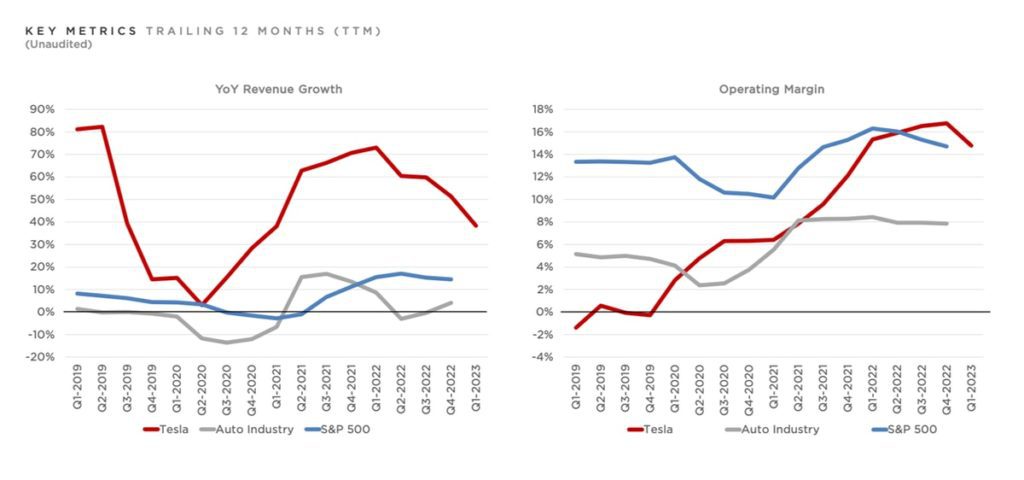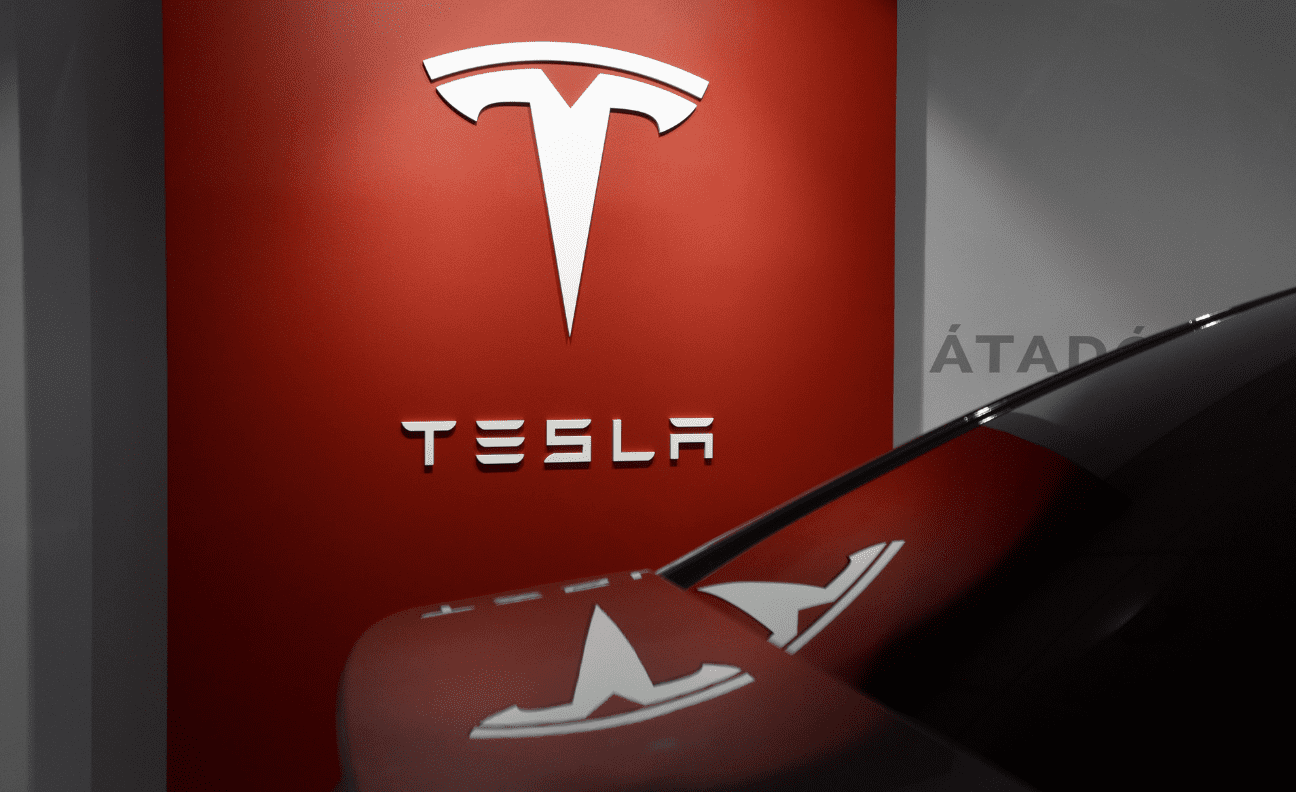Tesla chief executive, Elon Musk, recently made remarks suggesting that the electric car manufacturer could potentially continue to cut prices amidst a backdrop of turbulent economic conditions worldwide.
The multi-billionaire’s comments come in the wake of the company reporting a squeeze on its profit margins, which has been exacerbated by stiff competition in the market. In response to these challenges, Tesla has undertaken multiple price cuts in major markets, including the United States and China.
However, it comes as no surprise that these price adjustments have not been without consequences, as the company’s shares plummeted by over 4% in after-hours trade in New York.
Decline in Profit Margin Raises Concerns
The latest financial report from Tesla revealed a concerning dip in its profit margin, marking its lowest level in the last four years.
Specifically, the company’s gross profit margin declined to 18.2% for the three months ending in June, a significant drop from the 26.2% recorded during the same period last year.
What’s more, the profit margin squeeze is attributed to a combination of factors, including increased competition from established automakers and supply chain disruptions caused by global events, like the ongoing semiconductor shortage.
Musk’s Uncertainty Amid Economic Volatility
Addressing Wall Street analysts during a conference call, Mr. Musk acknowledged the uncertainty of the global economic situation, expressing that it’s like a rollercoaster and one day, it seems as though the world economy is on the brink of collapse, while the next, everything appears to be perfectly fine.
Therefore, this volatility leaves him unsure about the current state of affairs. He admitted that Tesla’s pricing decisions have been reactive to market conditions, but emphasised that the company remains agile and ready to adapt as needed.
Tesla’s price cuts helped lift deliveries and profit in the second quarter, but CEO Elon Musk cautioned that more reductions may be needed #WSJWhatsNow https://t.co/nykzpeDuxf pic.twitter.com/cFNEbsqLpd
— The Wall Street Journal (@WSJ) July 22, 2023
Balancing Short-term Sales and Long-term Strategy
Unsurprisingly, Investors are growing increasingly concerned about the prospect of further price cuts at Tesla, as it feels like the company is engaged in a never-ending price war with no clear long-term strategy to improve profit margins in the event of victory.
A Professor at the NYU Stern Business School has pointed out this apparent lack of foresight, urging Tesla to develop a concrete plan to boost margins should they emerge triumphant in the price war.
Moreover, the professor added that while aggressive pricing may bolster sales volume in the short term, Tesla must also focus on building brand loyalty and the perceived value of their products to protect margins over the long run.
Pursuit of Market Share Amid Record Deliveries
Earlier this year, Musk had publicly articulated his belief in prioritising higher sales over larger profits, leading Tesla to implement price reductions in key markets such as the United States, United Kingdom, and China, to effectively compete with rival manufacturers.
While this strategy has indeed resulted in increased market share and record vehicle deliveries, some industry experts wonder whether it is sustainable in the long term.
As previously mentioned, the Professor at NYU Stern remarked that this approach might work for a time, but without a clear plan to strengthen profit margins, Tesla’s financial health could be at risk in the face of unpredictable market dynamics.
The Global Push for Electrification and Charging Infrastructure
The electric vehicle industry has been witnessing rapid growth, with major automakers acknowledging the shift towards sustainable transportation. In a noteworthy development for the EV sector, Japanese motor industry giant, Nissan, announced that its EVs in the US and Canada would feature Tesla-developed charging ports starting from 2025.
This decision further cements Tesla’s influence in the market, as more carmakers embrace its EV charging technology. The chairperson of Nissan Americas emphasised the firm’s commitment to making electric mobility even more accessible, signalling a shared vision for the future of sustainable transportation.
Furthermore, this collaboration underscores the overall importance of charging infrastructure and the pivotal role it plays in accelerating the adoption of electric vehicles worldwide.
Collaboration and Innovation in the EV Industry
Similar moves have been observed from US car manufacturers Ford and General Motors, who are also embracing Tesla’s EV charging technology, again underscoring the company’s ongoing influence and technological prowess.
What’s more, the global push for electrification has forged an unprecedented level of cooperation among once-competing automakers, as they recognise the collective responsibility to combat climate change and create a cleaner, greener future for the planet.
Advantages of Tesla Potentially Cutting Prices
Dropping prices offers several distinct advantages for Tesla. Firstly, it allows the company to stay competitive in an increasingly crowded electric vehicle market, attracting more customers and expanding its market share.
Also, lower prices make Tesla’s vehicles more accessible to a wider range of consumers, thereby encouraging mass adoption of electric vehicles and contributing to a greener and sustainable transportation future.
Additionally, price reductions can stimulate higher sales volume, leading to improved economies of scale and potentially offsetting the impact on profit margins. Moreover, Tesla’s commitment to offering competitive prices reinforces its position as a leader in the EV industry and bolsters its brand reputation for providing innovative, high-quality products at competitive rates.
Overall, by strategically dropping prices, Tesla can continue to maintain its relevance and influence, driving the transition towards a more sustainable automotive landscape.

Possible Disadvantages to Cutting Prices
While dropping prices can yield some benefits, it also comes with its share of drawbacks for Tesla. One significant disadvantage is the potential squeeze on profit margins, as lower prices directly impact the company’s bottom line. This can limit Tesla’s ability to invest in research and development, jeopardising its capacity to innovate and stay ahead in the competitive EV market.
Moreover, frequent price reductions might lead to a perception of diminished product value among consumers, potentially tarnishing the premium image that Tesla has cultivated over the years.
Additionally, aggressive price cuts may trigger concerns among investors about the company’s long-term financial stability, leading to a decline in shareholder confidence. Furthermore, price reductions might spark a price war with rival manufacturers, further intensifying competition and reducing overall profitability in the industry.
Therefore, careful consideration is essential to strike the right balance between competitive pricing and sustainable financial growth to safeguard Tesla’s future success.
Conclusion
As Tesla navigates the volatile landscape of the global economy and fierce competition, Elon Musk’s willingness to continue cutting prices indicates a commitment to maintaining the company’s position at the forefront of the EV market.
However, the concern among investors about the impact on profit margins highlights the need for Tesla to balance short-term strategies with a more comprehensive, long-term vision. With the electric vehicle industry rapidly evolving and major players like Nissan, Ford, and General Motors adopting Tesla’s charging technology, the future remains both challenging and full of opportunities for the pioneering electric carmaker.
Though, it’s clear that only time will reveal how Tesla adapts to these tumultuous times while continuing to lead the charge toward a more sustainable automotive future. Ultimately, the journey ahead still seems to promise innovation, collaboration, and the ongoing pursuit of an emissions-free tomorrow.









